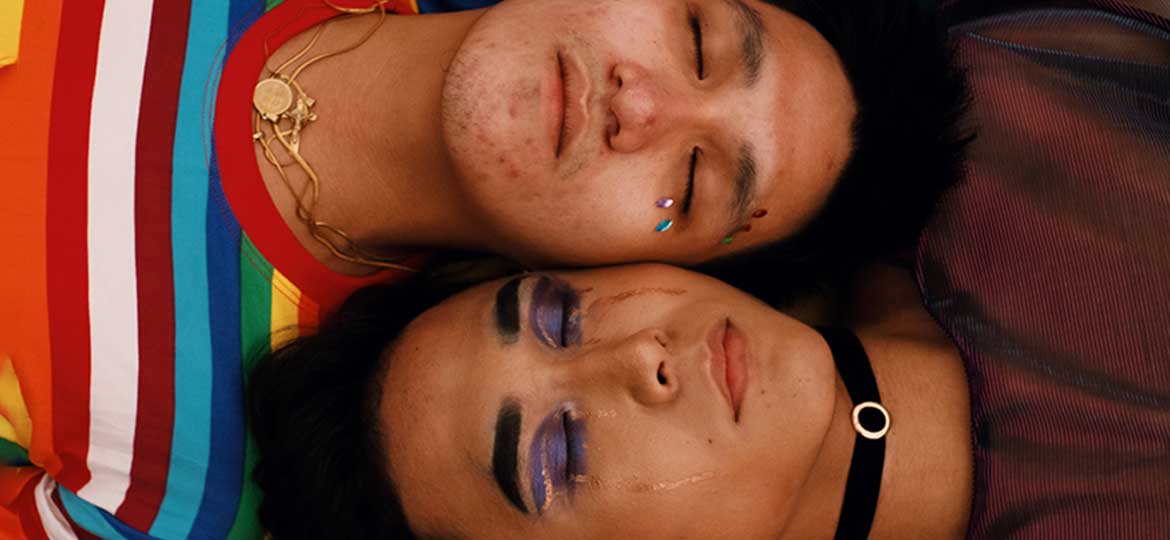Calgary LGBTQ+ Counselling and Therapy: Safe and Empowering

At our Calgary Psychologist Clinic, we understand that LGBTQ+ individuals face unique challenges and experiences that can impact their mental health and well-being. Our compassionate therapists have the experience and expertise to provide affirming counselling services that address the specific needs of the LGBTQ+ community.
Supporting Mental Health and Well-being
LGBTQ+ counselling and therapy are essential services that provide support and address the unique mental health challenges faced by individuals within the LGBTQ+ community. From discrimination and stigma to identity-related concerns, our therapists are here to help LGBTQ+ individuals navigate these issues with compassion and understanding.
Our Calgary Therapists Providing LGBTQ+ Counselling and Therapy
Andrea Krygier
Registered Psychologist
English, Spanish
Dr. Raheleh Tarani
Registered Provisional Psychologist
English, Farsi, Japanese (basic), Hindi, Turkish, Punjabi, Urdu
Murray Molohon
Registered Psychologist
English
Jarret Verwimp
Clinical Canadian Certified Counsellor
English, French, Spanish (basic)
Preeti Rakhra
Registered Provisional Psychologist
English, Hindi
Creating a Safe and Inclusive Space
In therapy sessions, creating a safe and inclusive space is paramount. Our therapists strive to provide a welcoming environment where LGBTQ+ individuals can express themselves freely without fear of judgment. We recognize the importance of validation, empathy, and understanding in helping LGBTQ+ individuals effectively manage their mental health challenges.
Addressing Specific Concerns
LGBTQ+ counselling acknowledges the specific mental health concerns faced by this community. Our therapists are knowledgeable about LGBTQ+ issues and can provide support for concerns such as internalized homophobia, coming out, and identity exploration. By building resilience and fostering self-acceptance, counselling aims to improve the overall well-being of LGBTQ+ individuals.
Specialized Therapy Services
We offer specialized therapy services tailored to the experiences of LGBTQ+ individuals. These services address areas such as sexual orientation exploration, gender identity affirmation, relationship and family dynamics, and coping with discrimination and minority stress. Our therapists have specific training and expertise in LGBTQ+ issues to ensure sensitive and affirming care for every individual.
Take the First Step Towards Affirming Care
Ready to prioritize your mental health and well-being? We’re here to help. Contact us today to schedule your free consultation and take the first step towards affirming care and support for LGBTQ+ individuals. At Best Choice Counselling & Assessments, we’re committed to empowering LGBTQ+ individuals to live authentically and thrive, one session at a time.
How LGBTQ Therapy Actually Works: An LGBTQ-Allied Therapist's Guide for Clients

The numbers are alarming – 73% of LGBTQ youth struggle with anxiety symptoms. Even more concerning, 45% of them had serious thoughts about suicide last year. These stark realities show why LGBTQ therapy plays such a crucial role in supporting the community’s mental health.
LGBTQ individuals need mental health treatment more often than others, especially when you have discrimination, bullying, or feelings of isolation. But the access remains limited – 60% of LGBTQ youth couldn’t get the mental health care they needed. The good news is that therapy designed specifically for LGBTQ clients helps reduce stress disorders, depression, panic attacks, and social anxiety.
Understanding LGBTQ-Affirming Therapy Approaches
LGBTQ-affirming therapy offers a unique approach that welcomes and confirms diverse sexual orientations and gender identities. This therapeutic framework helps clients deal with the negative effects of homophobia, transphobia, and heterosexism in their lives [1].
Key Principles of Affirmative Therapy
LGBTQ-affirming therapy builds on several core principles:
Creating a safe, non-judgmental environment that confirms clients’ experiences
Challenging heteronormative assumptions and biases
Incorporating cultural competency in understanding LGBTQ experiences
Prioritizing client self-determination and autonomy [1]
How It Differs from Traditional Therapy
LGBTQ-affirming therapy is different from conventional therapeutic approaches because it recognizes LGBTQ upbringing as a distinct cultural experience [2]. Affirming therapists understand that LGBTQ individuals face unique challenges and stressors that need specialized understanding and support.
Evidence-Based Benefits for LGBTQ Clients
Research shows powerful positive outcomes from LGBTQ-affirming therapy. Studies reveal that LGBTQ individuals in affirming therapy experience reduced depression, anxiety, and substance use in multiple clinical trials [3]. The American Psychological Association has recognized this approach as a “treatment that works” [3].
Affirming therapy works well because it combines with evidence-based treatments like Cognitive Behavioral Therapy (CBT). This combination provides a complete framework that addresses both general mental health concerns and LGBTQ-specific challenges [4].
Finding the Right LGBTQ Allied Psychologist or Therapist
Looking for a qualified LGBTQ-allied therapist takes time and careful research. Studies show that many LGBTQ individuals aren’t satisfied with health services because practitioners lack proper knowledge or education [5].
Everything in a Good Fit
A competent LGBTQ-allied therapist should have these qualities:
Strong knowledge of LGBTQ culture and issues
Work history with a variety of sexual orientations and gender identities
Deep grasp of minority stress factors
Steadfast dedication to LGBTQ-specific education
Professional credentials and proper licensing
Questions to Ask Your Potential Therapist
Clients should ask about the therapist’s experience and approach before starting therapy. Many therapists offer free consultations [6] that are a great way to get a sense of compatibility. Key screening questions should include:
“What percentage of your clients identify as LGBTQ?” [7] “How would you describe your experience using gender-neutral pronouns?” [8] “What is your approach to working with LGBTQ clients?” [9]
Creating Your Therapeutic Safe Space
Creating a therapeutic safe space requires understanding the key elements that make LGBTQ therapy work. Research shows 42% of LGBTQ individuals who sought mental health support avoided discussing their concerns due to fear of judgment [11].
Establishing Boundaries and Trust
Trust begins with clear boundaries. LGBTQ counseling success depends on:
Personal space and comfort levels
Privacy and confidentiality agreements
Respect for identity disclosure priorities
Clear expectations for therapeutic relationships
Communication Guidelines
Communication is the life-blood of affirming therapy. Therapists should use language that confirms their clients’ identities. Studies reveal 22% of LGBTQ youth avoid mental health care because they fear being outed [12].
Cultural Competency Expectations
Cultural competency goes beyond simple understanding. LGBTQ psychologists and counselors must demonstrate:
Detailed knowledge of LGBTQ experiences and challenges Active involvement with current LGBTQ issues and terminology Ongoing education about emerging topics in LGBTQ mental health
Creating a safe space demands commitment from both therapist and client. Research shows that visible signs of LGBTQ support in practices substantially increase client comfort [13]. Many affirming therapy spaces now display rainbow flags, inclusive literature, and other welcoming symbols that show acceptance and understanding.
Core Therapeutic Techniques
LGBTQ therapy works through specialized techniques that help with unique challenges LGBTQ people face. Research shows cognitive-behavioral psychotherapeutic interventions that target intersectional minority stress have shown promising outcomes [14].
Identity Affirmation Exercises
Identity affirmation work helps build self-worth through well-laid-out activities. These exercises include:
Cognitive appraisal and reappraisal techniques
Emotional expression activities
Personal exploration work
Values clarification work
Minority Stress Management Strategies
LGBTQ psychologists use specific strategies to help clients handle minority stress. Studies show sexual minorities face more severe stressors but have fewer ways to cope [15]. Therapists guide clients away from unhealthy coping mechanisms and help them build healthy responses through problem-focused behavioral efforts and cognitive reframing.
Internalized Stigma Processing
About 27.9% of people with mental health challenges experience internalized stigma [16]. LGBTQ-affirming therapy tackles this through specialized interventions. Research shows people with low self-esteem tend to experience high internalized stigma [16]. The therapeutic techniques focus on:
Building resilience through community connection Developing positive self-concept through cognitive restructuring Deepening coping resources through interpersonal support
Clinical trials show LGBTQ-affirmative CBT reduces depression, anxiety, and substance use in sexual minority individuals [17]. The success of these techniques depends on consistent practice and client involvement.
Navigating Common Therapy Challenges
LGBTQ therapy clients face unique challenges that need specialized attention and understanding. Research shows LGBTQ individuals face twice the risk of mental health disorders compared to their heterosexual and cisgender peers [18].
Addressing Identity-Related Concerns
Therapeutic settings reveal unique obstacles in identity development. LGBTQ psychologists help clients process feelings they might have pushed aside for years [18]. The challenges that stand out include:
Processing internalized negative beliefs
Navigating different stages of coming out
Managing societal stigma and discrimination
Addressing self-acceptance concerns
Managing Family Dynamics
LGBTQ counseling reveals complex challenges in family relationships. Unlike other minority groups who usually find support at home, LGBTQ individuals might face rejection from their own family members [18]. Research links family rejection strongly with higher risks of suicide attempts, depression, and substance abuse [19].
Overcoming Therapeutic Resistance
Previous experiences make many LGBTQ individuals reluctant to seek mental health support. This stems from psychiatry’s history of pathologizing LGBTQ identities [18]. Some clients come to therapy after facing discrimination in healthcare settings [18]. LGBTQ-affirming therapy creates a welcoming environment where all identities receive respect and acceptance [20].
LGBTQ counselors use specialized approaches to help clients build resilience against societal pressures [21]. They emphasize creating strong support networks and self-acceptance, which lead to better mental health outcomes.
Building Long-term Therapeutic Success
LGBTQ therapy’s long-term success depends on building green practices for coping and strong support systems. Research shows that LGB-specific coping strategies associate with higher self-esteem and greater life satisfaction [1].
Developing Coping Mechanisms
Note that effective coping strategies must tackle both general and LGBTQ-specific stressors. Studies show approach-based coping strategies lead to more positive outcomes [1]. Key evidence-based strategies include:
Participating with LGBTQ organizations
Practicing mindfulness techniques
Developing problem-solving skills
Building emotional regulation tools
Creating Support Networks
Strong support networks are a vital part of mental wellness. LGBTQ community centers provide significant mental health support [4] and services that are often free or heavily subsidized. People who receive support from LGBTQ-specific organizations demonstrate better mental health outcomes [22].
Maintaining Mental Health Progress
LGBTQ-affirming care emphasizes ongoing community connection and support, unlike traditional therapy approaches. Studies show LGBTQ individuals with access to affirming spaces report lower rates of depression and anxiety [22]. Long-term success depends on:
Regular connection with support systems
Consistent practice of coping skills
Professional guidance when needed
Active community involvement in LGBTQ activities
Research confirms better overall mental health outcomes and improved resilience in LGBTQ individuals who stay connected with community resources [1].
Measuring Progress and Success
LGBTQ therapy needs a systematic way to measure both psychological and identity-related growth. Studies show that early intervention services should support client autonomy without treating emotional distress as an illness [23].
Setting Realistic Therapy Goals
LGBTQ counseling works best when it starts with clear, measurable goals. Research reveals that only one-fifth of LGBTQ individuals ask for professional mental health support [23]. A successful goal-setting approach has these key elements:
Identity exploration milestones
Stress management measures
Support network development targets
Self-acceptance indicators
Tracking Emotional Well-being
Emotional well-being needs monitoring of several aspects at once. Studies show that LGBTQ youth with proper support have lower rates of depression and anxiety [24]. We track progress by looking at changes in self-esteem, resilience, and coping mechanisms.
Identifying Growth Milestones
Each person’s growth milestones reflect their unique experience. Research shows that sexual identity development milestones typically happen between ages 12-21. First awareness occurs at age 12.7, self-identification at 17.8, and coming out at 19.6 [25]. These milestones serve as key markers to measure therapeutic progress.
Mental health providers should know that milestone achievement is different based on cohort effects and cultural background [26]. Without doubt, therapy succeeds when we recognize and celebrate both small and most important achievements in the client’s experience toward authentic self-expression [27].
Conclusion
LGBTQ-affirming therapy is a vital support system that helps people navigate their unique mental health experiences. Research proves its effectiveness by showing reduced anxiety, depression, and improved overall well-being in LGBTQ clients who receive appropriate care.
The success of LGBTQ therapy depends on qualified allied therapists, safe spaces, evidence-based techniques, and strong support networks. These elements create a foundation that helps clients build resilience against minority stress and develop healthy coping mechanisms.
Each person’s path toward self-acceptance and mental wellness follows a unique timeline, making progress measurement highly personal. Clients achieve better long-term outcomes when they actively use LGBTQ-specific resources and maintain consistent therapeutic relationships.
LGBTQ-affirming therapy breaks down barriers to mental health care access through specialized understanding and targeted support. This approach enables clients to embrace their authentic selves and build emotional tools needed for lasting psychological well-being.
FAQs
Q1. What are the key components of LGBTQ-affirming therapy? LGBTQ-affirming therapy involves creating a safe, non-judgmental environment, challenging heteronormative assumptions, incorporating cultural competency, and prioritizing client self-determination. It addresses unique challenges faced by LGBTQ individuals and uses evidence-based techniques to reduce depression, anxiety, and substance use.
Q2. How can I find a qualified LGBTQ-allied therapist? Look for a therapist with cultural competence in LGBTQ issues, experience working with diverse sexual orientations and gender identities, and a clear understanding of minority stress factors. Ask about their experience using gender-neutral pronouns and their approach to working with LGBTQ clients. Be wary of therapists who dismiss or minimize experiences related to sexual orientation or gender identity.
Q3. What techniques are commonly used in LGBTQ therapy? LGBTQ therapy often employs identity affirmation exercises, minority stress management strategies, and internalized stigma processing. These may include cognitive appraisal techniques, emotional expression activities, problem-focused behavioral efforts, and cognitive restructuring to build resilience and develop a positive self-concept.
Q4. How does LGBTQ therapy address family-related challenges? LGBTQ therapy helps clients navigate complex family dynamics, including potential rejection from family members. Therapists work with clients to process feelings, manage societal stigma, and develop coping strategies. The focus is on building strong support networks and fostering self-acceptance to counteract negative family experiences.
Q5. How is progress measured in LGBTQ therapy? Progress in LGBTQ therapy is measured through a combination of psychological and identity-related growth indicators. This includes tracking changes in self-esteem, resilience, and coping mechanisms. Therapists work with clients to set realistic goals related to identity exploration, stress management, and support network development. Progress is highly individualized, acknowledging that each person’s journey toward self-acceptance follows its own timeline.
References
[1] – https://pmc.ncbi.nlm.nih.gov/articles/PMC5656566/
[2] – https://pmc.ncbi.nlm.nih.gov/articles/PMC7587917/
[3] – https://medicine.yale.edu/lgbtqmentalhealth/projects/mental-health-care/
[4] – https://pmc.ncbi.nlm.nih.gov/articles/PMC10374348/
[5] – https://societyforpsychotherapy.org/five-things-therapists-can-do-when-working-with-lgbtq-individuals/
[6] – https://www.everydayhealth.com/emotional-health/how-to-find-an-lgbtq-affirming-therapist/
[7] – https://pointfoundation.org/community/blog/how-to-find-an-lgbtq-affirming-therapist-3-questions-to-ask
[8] – https://www.hftd.org/competencyquestions
[9] – https://www.lgbtqtherapists.com/pdfs/samplequestions.pdf
[10] – https://growtherapy.com/blog/therapist-red-flags/
[11] – https://integratedlistening.com/blog/how-to-help-create-safety-for-lgbtq-clients-and-why-its-essential-to-therapy/
[12] – https://www.umassmed.edu/TransitionsACR/resources/culturally-competent-mhc-to-LGBTQIA/
[13] – https://pmc.ncbi.nlm.nih.gov/articles/PMC9887369/
[14] – https://www.sciencedirect.com/science/article/pii/S2772724622000373
[15] – https://pmc.ncbi.nlm.nih.gov/articles/PMC5695701/
[16] – https://ijmhs.biomedcentral.com/articles/10.1186/s13033-022-00567-2
[17] – https://pmc.ncbi.nlm.nih.gov/articles/PMC9434976/
[18] – https://psychiatryonline.org/doi/full/10.1176/appi.focus.20200001
[19] – https://www.mentalhealth.com/library/mental-health-challenges-lgbtq
[20] – https://www.lyrahealth.com/blog/affirmative-therapy/
[21] – https://therapy4everybody.com/lgbtq-challenges/
[22] – https://www.bmindfulpsychology.co.uk/post/coping-with-lgbtq-discrimination-and-stigma-strategies-for-mental-health-and-wellbeing
[23] – https://pmc.ncbi.nlm.nih.gov/articles/PMC8654681/
[24] – https://amchp.org/2020/06/24/strategies-for-improving-emotional-well-being-among-lgbtq-youth-stories-from-the-field-of-mch/
[25] – https://pmc.ncbi.nlm.nih.gov/articles/PMC8581765/
[26] – https://pmc.ncbi.nlm.nih.gov/articles/PMC8216084/
[27] – https://www.wondermind.com/article/lgbtq-therapists/
Calgary Therapy Mental Health Issues
In our Calgary counselling clinic, we help with many mental health problems. Our therapists can assist with a range of issues. These include grief, trauma, anxiety, depression, parenting challenges, PTSD, eating disorders, postpartum depression, fears and phobias, ADHD, self-esteem issues, relationship difficulties, OCD and many more.
No matter what you’re dealing with, our therapists are here to provide evidence-based therapy that fits your needs. We want to help you overcome challenges, build resilience, and find more happiness and fulfillment in your life.




















Calgary Counselling And Psychologist Services
Our Calgary Psychologists and therapists offer counselling and formal psychological assessment services for individuals, couples, and families. We tailor these services to meet the unique needs of each client. Our goal is to support our clients in achieving their personal and relational goals.
We help families improve communication and solve problems. We also offer assessments for learning disabilities and ADHD. Our support extends to various mental health issues. Our support covers many mental health issues.
Our therapists dedicate themselves to providing a safe and supportive environment for clients of all ages and backgrounds. They help clients explore their thoughts, feelings, and experiences. The team is committed to creating a space where clients can feel comfortable and understood. They strive to help clients on their journey towards healing and growth.
We are here to help with individual therapy, couples counseling, or support for your child, teen or family. We offer counseling services in person and virtually. This makes it convenient and flexible for our clients to access our services. Whatever challenges you may be facing, we are committed to guiding you towards healing, growth, and greater well-being.
































